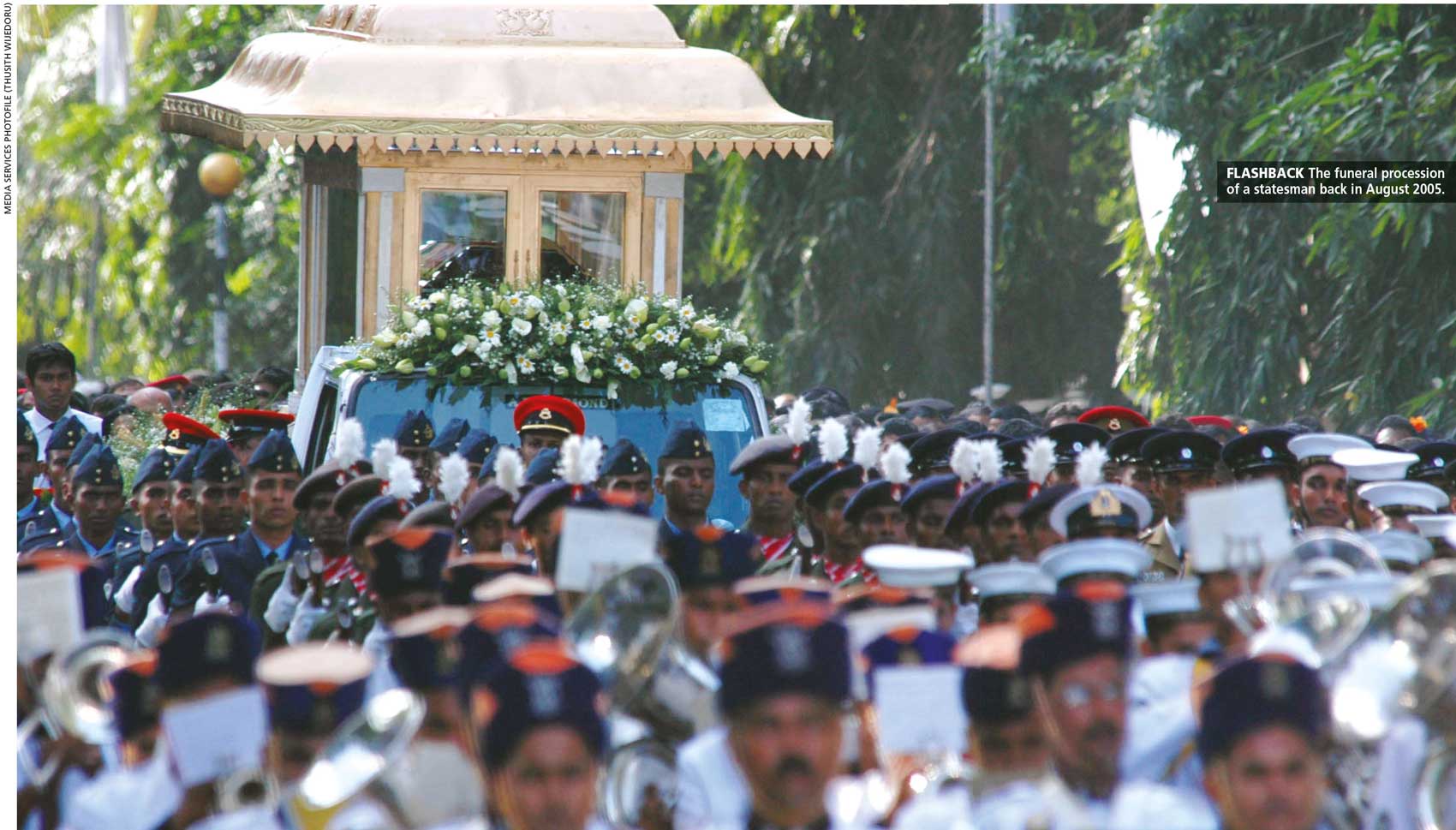STATE OF THE NATION

MAY ALL BEINGS HERE BE HAPPY AGAIN
Wijith DeChickera dips into a lost potential of the past in order that a lasting legacy of enlightenment might alight once more on our precious land
May being the month of Vesak is when islanders might miss one of their more illustrious sons the most. It was he, the late Sri Lankabhimanya Lakshman Kadirgamar, who worked to make our holiday more of a holy day hallowed by the world at large and not the native faithful alone.
 At home, he was a savvy politician at a time when the appellation had more honour. Abroad, we had a suave pursuivant of the type of internationalism that would not bring the state disgrace.
At home, he was a savvy politician at a time when the appellation had more honour. Abroad, we had a suave pursuivant of the type of internationalism that would not bring the state disgrace.
And now, more than ever perhaps, Sri Lanka misses statesmen of his calibre. Not only because of the noble ideals that he espoused such as unity, diversity, and unity in diversity as a precursor to national greatness.
But also, the potential he carried to unite people beyond the pale of politics in a bond surpassing rank globalism sans principle or cultivate the good that comes when brothers and sisters dwell in amity. And galvanise an island race to greater achievement.
“I am first and foremost a citizen of Sri Lanka. I do not carry labels of race or religion or any other label. I would say quite simply that I have grown up with the philosophy that I am a citizen of the world. I do not subscribe to any particular philosophy; I have no fanaticism; I have no communalism. I believe there should be a united Sri Lanka,” Kadirgamar asserted.
He added: “I believe that all our peoples can live together; they did live together. I think they must in the future learn to live together after this trauma is over. We have four major religions in the country – Buddhism, Islam, Hinduism and Christianity. All these religions exist very peacefully. They get on very well.”
The trauma is over… yet, the tragedy continues – in the name of divisive policies and a none too subtle ethnic chauvinism.
“I see no reason why the major races in the country, the Tamils and the Sinhalese, cannot again build a relationship of confidence and trust. That is my belief,” the late great pluralist averred.
It is evidently a belief that is not shared by those who would embrace power at the cost of an inclusive pluralism.
You understand too late that he had a grey head full of grand ideas but feet of clay that are par for the course in even the older dispensation of island politics.
Sorry to say that he hitched his wagon to a shooting star that was gone before it could ignite the happier prospect of peace with dignity for all this island’s peoples.
Long has it been the regret of nobler islanders from every walk of life that his genteel escutcheon did not outshine the shades of terrorism.
What would the fallen icon of a truer and prouder nationalism that embraced diversity but eschewed discrimination have made of our present prospects?
Would he have thrilled to the sabre rattling tattoos of hollow victories being trumpeted in the more chauvinistic quarters of national pride? Or would he have cautioned us again against the jingoism that militates against genuine transformation from a postcolonial to postwar and post-conflict society?
Maybe far more importantly, could this schoolboy athlete and celebrated mandarin have served as a role model, for a more tolerant and inclusive humanity to be fostered in the planet’s erstwhile refuge of Theravada Buddhism?
A Christian from Jaffna, this venerable elder statesman was a veritable poster boy for the elusive peace that passes all understanding – deep reconciliation between all this island’s children that has continued to evade a mutually agreeable definition and concerted doing.
As long ago as January 1996, the then Minister of Foreign Affairs told LMD (he was this magazine’s very first Sri Lankan Of The Year in 1995) in an exclusive interview that “the issue of war and peace should not be looked at from a selfish political angle.”
Today, we can only wonder how he would have taken Sri Lanka’s defiant stance at the UNHRC and its rhetoric driven incalculable math in the face of an increasingly disaffected electorate at home. And the ever looming likelihood that our island nation’s sovereignty is being compromised by sinister bills to subvert its territorial integrity in the name of rapid growth or rescue from the fiscal doldrums!
The late Kadir – as he was widely and fondly known – was something of a Renaissance man as attested by his obituaries over 25 years ago. It is therefore, fitting that we quote a giant of the Enlightenment, German literary genius Johann Wolfgang von Goethe, whose last words were “mehr licht!” (more light!).
In this the month of birth, rebirth and enlightenment, how many of us would ask – or even demand, diplomatically enough – to know where the last refuge of Theravada Buddhism is heading?
May all beings be happy!




Leave a comment